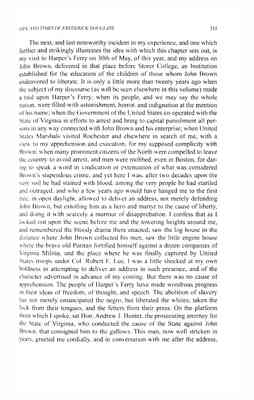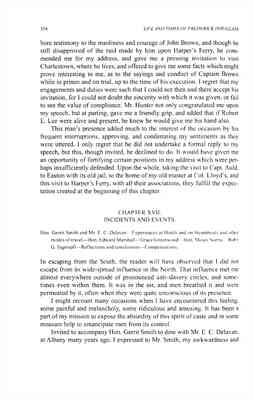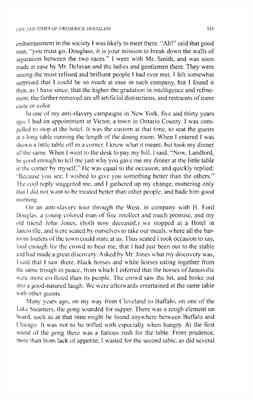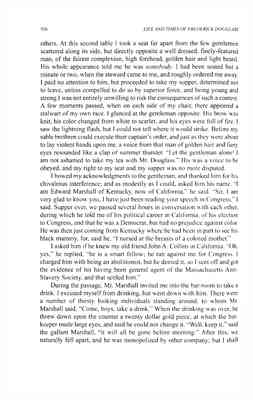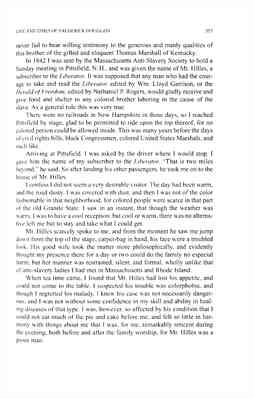Pages
201
LIFE AND TIMES OF FREDERICK DOUGLASS 353
The next, and last noteworthy incident in my experience, and one which further and strikingly illustrates the idea with which this chapter sets out, is my visit to Harper's Ferry on 30th of May, of this year, and my address on John Brown, delivered in that place before Storer College, an Institution established for the education of the children of those whom John Brown endeavored to liberate. It is only a little more than twenty years ago when the subject of my discourse (as will be seen elsewhere in this volume) made a raid upon Harper's Ferry; when its people, and we may say the whole nation, were filled with astonishment, horror, and indignation at the mention of his name; when the Government of the United States co-operated with the State of Virginia in efforts to arrest and bring to capital punishment all persons in any way connected with John Brown and his enterprise; when United States Marshals visited Rochester and elsewhere in search of me, with a view to my apprehension and execution, for my supposed complicity with Brown; when many prominent citizens of the North were compelled to leave the country to avoid arrest, and men were mobbed, even in Boston, for daring to speak a word in vindication or extenuation of what was considered Brown's stupendous crime; and yet here I was, after two decades upon the very soil he had stained with blood, among the very people he had startled and outraged, and who a few years ago would have hanged me to the first tree, in open daylight, allowed to deliver an address, not merely defending John Brown, but extolling him as a hero and martyr to the cause of liberty, and doing it with scarcely a murmur of disapprobation. I confess that as I looked out upon the scene before me and the towering heights around me, and remembered the bloody drama there enacted; saw the log house in the distance where John Brown collected his men, saw the little engine house where the brave old Puritan fortified himself against a dozen companies of Virginia Militia, and the place where he was finally captured by United States troops under Col. Robert E. Lee, I was a little shocked at my own boldness in attempting to deliver a address in such presence, and of the character advertised in advance of my coming. But there was no cause of apprehension. The people of Harper's Ferry have made wondrous progress in their ideas of freedom, of thought, and speech. The abolition of slavery has not merely emancipated the negro, but liberated the whites; taken the lock from their tongues, and the fetters from their press. On the platform from which I spoke, sat Hon. Andrew J. Hunter, the prosecuting attorney for the State of Virginia, who conducted the cause of the State against John Brown, that consigned him to the gallows. This man, now well stricken in years, greeted me cordially, and in conversation with me after the address,
202
354 LIFE AND TIMES OF FREDERICK DOUGLASS
bore testimony to the manliness and courage of John Brown, and though he still disapproved of the raid made by him upon Harper's Ferry, he commended me for my address, and gave me a pressing invitation to visit Charlestown, where he lives, and offered to give me some facts which might prove interesting to me, as to the sayings and conduct of Captain Brown while in prison and on trial, up to the time of his execution. I regret that my engagements and duties were such that I could not then and there accept his invitation, for I could not doubt the sincerity with which it was given, or fail to see the value of compliance. Mr. Hunter not only congratulated me upon my speech, but at parting, gave me a friendly grip, and added that if Robert E. Lee were alive and present, he knew he would give me his hand also.
This man's presence added much to the interest of the occasion by his frequent interruptions, approving, and condemning my sentiments as they were uttered. I only regret that he did not undertake a formal reply to my speech, but this, though invited, he declined to do. It would have given me an opportunity of fortifying certain positions in my address which were perhaps insufficiently defended. Upon the whole, taking the visit to Capt. Auld. to Easton with its old jail, to the home of my old master at Col. Lloyd's, and this visit to Harper's Ferry, with all their associations, they fulfill the expectation created at the beginning of this chapter.
CHAPTER XVII.INCIDENTS AND EVENTS. Hon. Gerrit Smith and Mr. E. C. Delavan—Expericnces at Hotels and on Steamboats and other modes of travel—Hon. Edward Marshall—Grace Greenwood—Hon. Moses Norris— Rob't G. Ingersoll—Reflections and conclusions—Compensations.In escaping from the South, the reader will have observed that I did not escape from its wide-spread influence in the North. That influence met me almost everywhere outside of pronounced anti-slavery circles, and sometimes even within them. It was in the air, and men breathed it and were permeated by it, often when they were quite unconscious of its presence.
I might recount many occasions when I have encountered this feeling, some painful and melancholy, some ridiculous and amusing. It has been a part of my mission to expose the absurdity of this spirit of caste and in some measure help to emancipate men from its control.
Invited to accompany Hon. Gerrit Smith to dine with Mr. E. C. Delavan, at Albany many years ago, I expressed to Mr. Smith, my awkwardness and
203
LIFE AND TIMES OF FREDERICK DOUGLASS 355
embarrassment in the society I was likely to meet there. "Ah!" said that good man, "you must go, Douglass, it is your mission to break down the walls of separation between the two races." I went with Mr. Smith, and was soon made at ease by Mr. Delavan and the ladies and gentlemen there. They were among the most refined and brilliant people I had ever met. I felt somewhat surprised that I could be so much at ease in such company, but I found it then, as I have since, that the higher the gradation in intelligence and refinement, the farther removed are all artificial distinctions, and restraints of mere cast or color.
In one of my anti-slavery campaigns in New York, five and thirty years ago, I had an appointment at Victor, a town in Ontario County. I was compelled to stop at the hotel. It was the custom at that time, to seat the guests at a long table running the length of the dining room. When I entered I was shown a little table off in a corner. I knew what it meant, but took my dinner all the same. When I went to the desk to pay my bill, I said, "Now, Landlord, be good enough to tell me just why you gave me my dinner at the little table in the corner by myself." He was equal to the occasion, and quickly replied: "Because you see, I wished to give you something better than the others." The cool reply staggered me, and I gathered up my change, muttering only that I did not want to be treated better than other people. and bade him good morning.
On an anti-slavery tour through the West, in company with H. Ford Douglas, a young colored man of fine intellect and much promise, and my old friend John Jones, (both now deceased,) we stopped at a Hotel in Janesviille, and were seated by ourselves to take our meals, where all the barroom loafers or the town could stare at us. Thus seated I took occasion to say, loud enough for the crowd to hear me, that I had just been out to the stable and had mack a great discovery. Asked by Mr. Jones what my discovery was, I said that I saw there, black horses and white horses eating together from the same trough in peace, from which I inferred that the horses of Janesville 11 were more civilized than its people. The crowd saw the hit, and broke out into a good-natured laugh. We were afterwards entertained at the same table with other guests.
Many years ago, on my way from Cleveland to Buffalo, on one of the Lake Steamers, the gong sounded for supper. There was a rough element on board, such as at that time might be found anywhere between Buffalo and Chicago. It was not to be trifled with especially when hungry. At the first sound of the gong there was a furious rush for the table. From prudence, more than from lack of appetite, I waited for the second table, as did several
204
LIFE AND TIMES OF FREDERICK DOUGLASS 356
others. At this second table I took a seat far apart from the few gentlemen scattered along its side, but directly opposite a well dressed, finely-featured man, of the fairest complexion, high forehead, golden hair and light beard. His whole appearance told me he was somebody. I had been seated but a minute or two, when the steward came to me, and roughly ordered me away. I paid no attention to him, but proceeded to take my supper, determined not to leave, unless compelled to do so by superior force, and being young and strong I was not entirely unwilling to risk the consequences of such a contest. A few moments passed, when on each side of my chair, there appeared a stalwart of my own race. I glanced at the gentleman opposite. His brow was knit, his color changed from white to scarlet, and his eyes were full of fire. I saw the lightning flash, but I could not tell where it would strike. Before my sable brethren could execute their captain's order, and just as they were about to lay violent hands upon me, a voice from that man of golden hair and fiery eyes resounded like a clap of summer thunder. "Let the gentleman alone! I am not ashamed to take my tea with Mr. Douglass." His was a voice to be obeyed, and my right to my seat and my supper was no more disputed.
I bowed my acknowledgments to the gentleman, and thanked him for his chivalrous interference; and as modestly as I could, asked him his name. "I am Edward Marshall of Kentucky, now of California," he said. "Sir, I am very glad to know you. I have just been reading your speech in Congress," I said. Supper over, we passed several hours in conversation with each other, during which he told me of his political career in California, of his election to Congress, and that he was a Democrat, but had no prejudice against color. He was then just coming from Kentucky where he had been in part to see his black mammy, for, said he, "I nursed at the breasts of a colored mother."
I asked him if he knew my old friend John A. Collins in California. "Oh, yes," he replied, "he is a smart fellow; he ran against me for Congress. I charged him with being an abolitionist, but he denied it, so I sent off and got the evidence of his having been general agent of the Massachusetts Anti-Slaver Society, and that settled him."
During the passage, Mr. Marshall invited me into the bar-room to take a drink. I excused myself from drinking, but went down with him. There were a number of thirsty looking individuals standing around, to whom Mr. Marshall said, "Come, boys, take a drink." When the drinking was over, he threw down upon the counter a twenty dollar gold piece, at which the barkeeper made large eyes, and said he could not change it. "Well, keep it," said the gallant Marshall, "it will all be gone before morning." After this, we naturally fell apart, and he was monopolized by other company; but I shall
205
LIFE AND TIMES OF FREDERICK DOUGLASS 357
never fail to bear willing testimony to the generous and manly qualities of this brother of the gifted and eloquent Thomas Marshall of Kentucky.
In 1842 I was sent by the Massachusetts Anti-Slavery Society to hold a Sunday meeting in Pittsfield, N.H., and was given the name of Mr. Hilles, a subscriber to the Liberator. It was supposed that any man who had the courage to take and read the Liberator; edited by Wm. Lloyd Garrison, or the Herald of Freedom, edited by Nathaniel P. Rogers, would gladly receive and give food and shelter to any colored brother laboring in the cause of the slave. As a general rule this was very true.
There were no railroads in New Hampshire in those days, so I reached Pittsfield by stage, glad to be permitted to ride upon the top thereof, for no colored person could be allowed inside. This was many years before the days of civil rights bills, black Congressmen, colored United States Marshals, and such like.
Arriving at Pittsfield, I was asked by the driver where I would stop. I gave him the name of my subscriber to the Liberator. "That is two miles beyond," he said. So after landing his other passengers, he took me on to the house of Mr. Hilles.
I confess I did not seem a very desirable visitor. The day had been warm, and the road dusty. I was covered with dust, and then I was not of the color fashionable in that neighborhood, for colored people were scarce in that part of the old Granite State. I saw in an instant, that though the weather was warm, I was to have a cool reception; but cool or warm, there was no alternative left me but to stay and take what I could get.
Mr. Hilles scarcely spoke to me, and from the moment he saw me jump down from the top of the stage, carpet-bag in hand, his face wore a troubled look. His good wife took the matter more philosophically, and evidently thought my presence there for a day or two could do the family no especial harm; but her manner was restrained, silent, and formal, wholly unlike that of anti-slavery ladies I had met in Massachusetts and Rhode Island.
When tea time came, I found that Mr. Hilles had lost his appetite, and could not come to the table. I suspected his trouble was colorphobia, and though I regretted his malady, I knew his case was not necessarily dangerous; and I was not without some confidence in my skill and ability in healing diseases of that type. I was, however, so affected by his condition that I could not eat much of the pie and cake before me, and felt so little in harmony with things about me that I was, for me, remarkably reticent during the evening, both before and after the family worship, for Mr. Hilles was a pious man.
